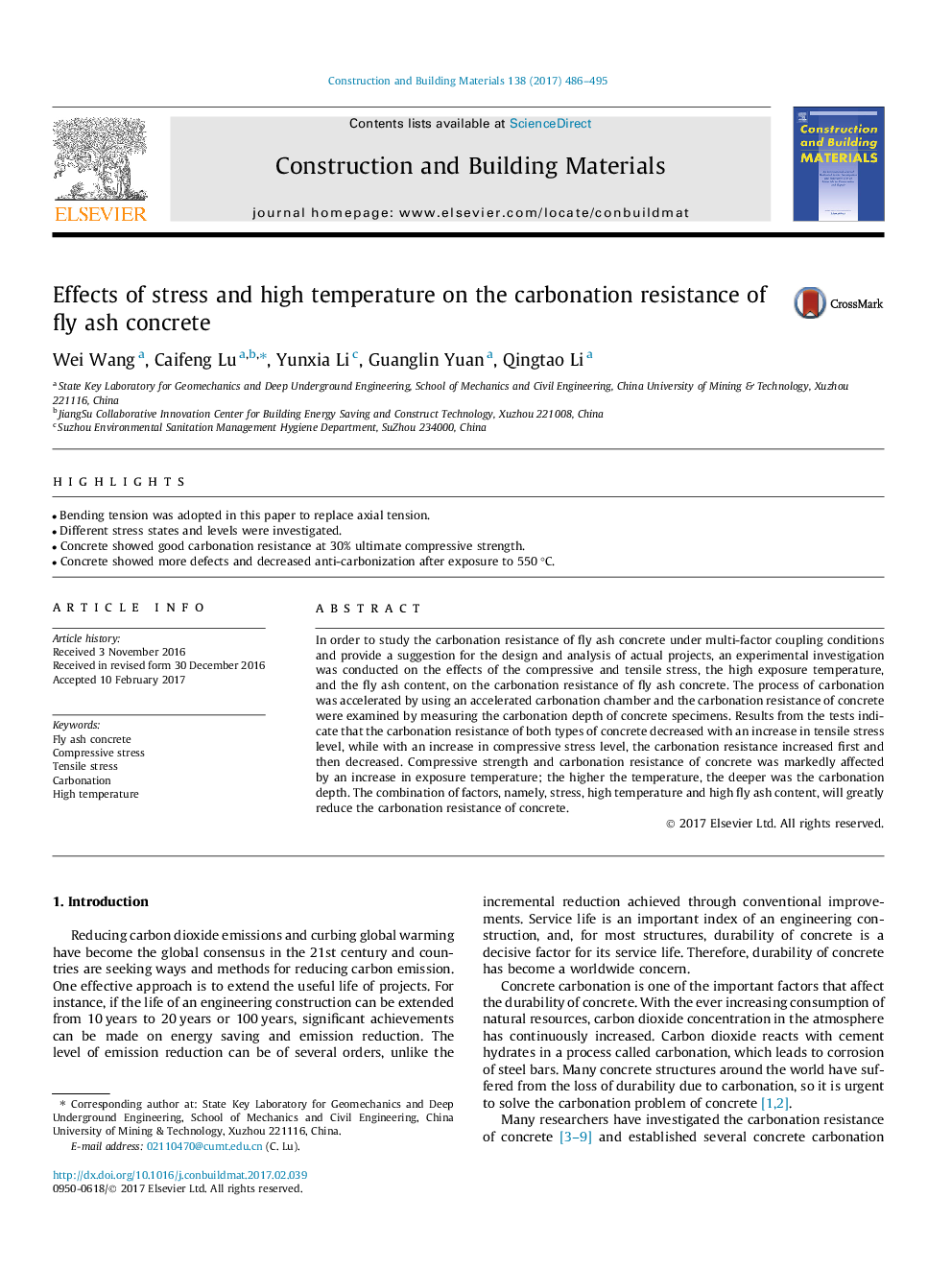| کد مقاله | کد نشریه | سال انتشار | مقاله انگلیسی | نسخه تمام متن |
|---|---|---|---|---|
| 4913738 | 1428768 | 2017 | 10 صفحه PDF | دانلود رایگان |
عنوان انگلیسی مقاله ISI
Effects of stress and high temperature on the carbonation resistance of fly ash concrete
ترجمه فارسی عنوان
اثرات تنش و درجه حرارت بالا بر مقاومت به کربنات بتن خاکستر پروازی
دانلود مقاله + سفارش ترجمه
دانلود مقاله ISI انگلیسی
رایگان برای ایرانیان
کلمات کلیدی
بتونه خاکستر پرواز تنش فشاری، تنش کششی، کربناته، درجه حرارت بالا،
ترجمه چکیده
به منظور مطالعه مقاومت کربناتی بتونه کاربیدی تحت شرایط اتصال چند فاکتوری و ارائه پیشنهادی برای طراحی و تحلیل پروژه های واقعی، یک مطالعه تجربی بر روی اثرات تنش فشاری و کششی، و محتوای خاکستر، بر روی مقاومت در برابر کربن بتن خاکستر پرواز. فرایند کربناته با استفاده از یک اتاق کربناته شتاب دهنده تسریع شد و مقاومت کربنیت بتن با اندازه گیری عمق کربن نمونه های بتنی مورد بررسی قرار گرفت. نتایج آزمون ها نشان می دهد که مقاومت به کربنات هر دو نوع بتن با افزایش سطح استرس کششی کاهش می یابد، در حالی که با افزایش سطح استرس فشاری، مقاومت کربناته اولا افزایش می یابد و سپس کاهش می یابد. مقاومت فشاری و مقاومت به کربن بتن به طور قابل توجهی تحت تأثیر افزایش دمای قرار گرفتن قرار می گیرد. دمای بالاتر، عمق کربناته عمیق تر بود. ترکیبی از عوامل، به ویژه استرس، دمای بالا و محتوای خاکستر پرتوی، به میزان قابل توجهی مقاومت در برابر کربنات بتن را کاهش می دهد.
موضوعات مرتبط
مهندسی و علوم پایه
سایر رشته های مهندسی
مهندسی عمران و سازه
چکیده انگلیسی
In order to study the carbonation resistance of fly ash concrete under multi-factor coupling conditions and provide a suggestion for the design and analysis of actual projects, an experimental investigation was conducted on the effects of the compressive and tensile stress, the high exposure temperature, and the fly ash content, on the carbonation resistance of fly ash concrete. The process of carbonation was accelerated by using an accelerated carbonation chamber and the carbonation resistance of concrete were examined by measuring the carbonation depth of concrete specimens. Results from the tests indicate that the carbonation resistance of both types of concrete decreased with an increase in tensile stress level, while with an increase in compressive stress level, the carbonation resistance increased first and then decreased. Compressive strength and carbonation resistance of concrete was markedly affected by an increase in exposure temperature; the higher the temperature, the deeper was the carbonation depth. The combination of factors, namely, stress, high temperature and high fly ash content, will greatly reduce the carbonation resistance of concrete.
ناشر
Database: Elsevier - ScienceDirect (ساینس دایرکت)
Journal: Construction and Building Materials - Volume 138, 1 May 2017, Pages 486-495
Journal: Construction and Building Materials - Volume 138, 1 May 2017, Pages 486-495
نویسندگان
Wei Wang, Caifeng Lu, Yunxia Li, Guanglin Yuan, Qingtao Li,
